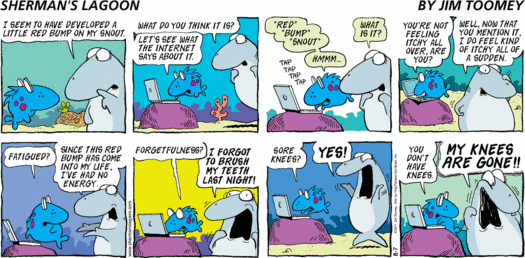August 31st, 2011 by Bryan Vartabedian, M.D. in Opinion, True Stories
No Comments »

Sometime around 1998 in the Texas Medical Center:
DrV: (enters exam room) Hey, How are you? I’m Bryan Vartabedian (extends hand).
Father: (arms crossed, smiling, leaning against wall) Oh I know who you are, Doc. And I know where you went to school, where you’ve lived, if you’ve been sued and a few other things. And I’m fine, by the way.
DrV: Um, Okay. (Shakes hands with father. Looking to child, scruffing his hair). And this must be Caleb.
An odd moment, for sure. When it happened I didn’t know what it was about. After similar encounters I understood. It was about where patients found themselves in the early days of the information revolution. And there was the father who wheeled into the exam room two large boxes of printouts perched on a dolly. Inkjet validation of his role in the decision about his son’s surgery.
These situations illustrate Read more »
*This blog post was originally published at 33 Charts*
August 16th, 2011 by DavedeBronkart in Opinion
No Comments »

An SPM member emailed this, with the playful subject line “A New e-Patient”:

(Click the image to go to the high-res on the comic’s site; © Copyright 2011 King Features Syndicate, all rights reserved.)
Funny comic, but it’s a common misconception that “e-patient” = anyone who googles (or bings, or webmd’s, or…). Wrong. E-patients are empowered, engaged, educated etc – not mindless, and not likely to freak out at the first thing they read.
When you search Read more »
*This blog post was originally published at e-Patients.net*
August 15th, 2011 by Berci in Opinion
No Comments »

Recently, I’ve had an interview with a national newspaper and the woman who performed the interview told me she was surprised that I seemed to be the first doctor in her life who was happy about patients using the internet. Well, she surprised me with this statement as I’ve never thought about that before. But she must be right. There are many doctors who get upset when they find out the patient tried to find information online. They are frustrated as they don’t even know how to use these online tools and have no idea how to help the patients in this perspective.
Myself, I’m pretty much happy about it. I love to hear patients Read more »
*This blog post was originally published at ScienceRoll*
January 5th, 2011 by John Di Saia, M.D. in News, Opinion
1 Comment »

From the Chicago Tribune:
A 35-year-old woman who wanted to resculpt herself for the new year with liposuction and a buttocks enhancement is dead from apparent complications of plastic surgery, her husband and lawyer said Thursday. Miami customer service representative Lidvian Zelaya died Monday, hours after the operation began at Strax Rejuvenation and Aesthetics Institute, a busy cosmetic surgery practice in Lauderhill. Zelaya went to Strax to have fat suctioned from her back and belly, and to have the material injected into her backside, family representatives said. She chose Strax because she got a good deal. Aronfeld said the operation was to be done by Dr. Roger L. Gordon. He was disciplined by the state in connection with two plastic surgery deaths in 2004.
This is getting ridiculous. Liposuction deaths have been frequent in the media as of late. And this surgeon, Roger L. Gordon, M.D., is a real, board-certified plastic surgeon as per the American Board of Medical Specialties (ABMS).
Then again, plastic surgery IS surgery and therefore has risk associated with it. Was this an unfortunate accident or something else? How can a potential patient choose well to limit the risk of cosmetic surgery? Read more »
*This blog post was originally published at Truth in Cosmetic Surgery*
December 31st, 2010 by DavedeBronkart in Better Health Network, Health Tips, Research
2 Comments »

This is the first of the follow-up posts I hope to write from participating in the Salzburg Global Seminar titled “The Greatest Untapped Resource in Healthcare? Informing and Involving Patients in Decisions about Their Medical Care.”
One of our purposes on this site is to help people develop e-patient skills, so they can be more effectively engaged in their care. One aspect is shared decision making, which we wrote about in September. A related topic, from August, is understanding the challenges of pathology and diagnosis. Both posts teach about being better informed partners for our healthcare professionals.
I’ve recently learned of an another topic, which I’m sure many of you know: Practice variation. This is a big subject, and I’ll have several posts about it. It’s complex, the evidence about it is overwhelming, and its cost is truly enormous. Read more »
*This blog post was originally published at e-Patients.net*















